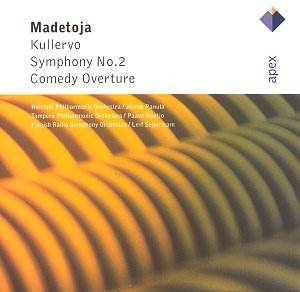Even if you have various other performances of these
works I confidently recommend that you get this bargain price disc.
OK, these are oldish recordings but they sound good.
Madetoja should be a draw for all Sibelians and Klami
enthusiasts. He is like and unlike both composers. He studied with Sibelius
1908-10 and his Second Symphony has a Sibelian air though tending more
towards the Tchaikovsky-end than the quasi-minimalist northern fastnesses
of The Bard and Luonnotar. He has Klami's feeling for
woodwind writing (listen to 4.13 onwards in the andante of the
symphony).
These recordings are drawn from the Finlandia catalogue
and collectors who have been in this beautiful game for
years will recognise them and may well have earlier LP or CD avatars.
The competition is from other sets including the complete cycle of three
symphonies from both Finlandia and Chandos (Petri Sakari, Iceland SO).
If the Comedy Overture is lithely and cleanly
turned without padding, Kullervo, while just as tightly formed,
is more intense and Tchaikovskian. The Comedy Overture has economic
classical virtue on its side and goes better than I have heard it in
any other recording. It could have gone with more zip than it has here
but it is played in a lively style allying it with John Foulds' delightfully
flouncy overture Le Cabaret (to be heard on Lyrita Recorded Edition
- from Harold Moores in London).
The Tampere PO/Rautio recording of the Second Symphony
was the version through which I first encountered the work in about
1982. It was through the kindness of Mark Lehman (to whom I owe so much
of my musical knowledge) that I had a cassette copy of the original
LP. In the case of this work it was love at first hearing. No performance
since then (and I have heard several including radio relays) has improved
on that first meeting. Surely no-one can be immune to the opening of
the symphony with its almost tangible suggestion of a Finnish lakeside,
aestival warmth and dragonflies floating lazily past. The tune which
Madetoja uses seems to breathe and stretch and extend endlessly. Rautio
shapes it lovingly and does not go for point-making - letting it speak
without 'exegesis'. Once you hear this theme you will not be able to
get it out of your head nor would you want to. It also has the potential
to be developed dramatically. The idyllic side is contrasted with the
tragic in the finale which is inflected with the war years. If you need
some 'waymarkers' then think of Sibelius 1, 2 and 3 and Tchaikovsky
5. This is highly romantic music which is not to say sloppy or meretricious.
None of his other works have the slippery beauty of this piece. The
Third Symphony seems positively desiccated by comparison. The First
Symphony is very good in an early Sibelian style but lacks the obstinately
lissom qualities of the Second. Do try it anyway but after this
APEX disc which has an outright recommendation from me.
Notes are brief, succinct and perfectly acceptable.
Rob Barnett


